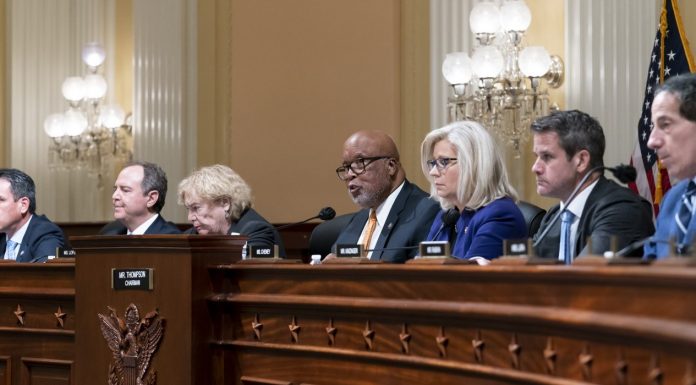(Headline USA) The Supreme Court is allowing the release of presidential documents sought by the congressional committee investigating the Jan. 6 uprising.
The justices on Wednesday rejected a bid by former President Donald Trump to withhold documents from the highly partisan committee until the issue is finally resolved by the courts.
The decision was yet another rebuff of the former president—who appointed a third of its justices—while affirming the court’s apolitical nature.
Alone among the justices, Clarence Thomas said he would have granted Trump’s request to keep the documents on hold.
Although Democrats claim a 6–3 ideological imbalance as justification for packing the court with radical leftist jurists, court-watching realists note more of a 3–3–3 split with Trump-appointed justices Brett Kavanaugh and Amy Coney Barrett frequently stradling the center alongside George W. Bush-appointed Chief Justice John Roberts.
Historically, the pressures of the Washington, DC, establishment have led many GOP-appointed justices to pivot leftward, while its liberal arm remains unwaveringly loyal to the Democrat party-line principles.
The court’s current bench, fearing how Democrat activists might react, previously refused to hear cases that challenged the disputed outcome of the 2020 election—including one from Texas Attorney General Ken Paxton and one from Pennsylvania’s GOP-led legislature. Both were dismissed for procedural reasons rather than on their merit.
Following the high court’s latest action, there is no legal impediment to turning over the documents, which are held by the National Archives and Records Administration.
They include presidential diaries, visitor logs, speech drafts and handwritten notes dealing with Jan. 6 from the files of former chief of staff Mark Meadows.
Trump and his backers have denounced the effort as yet another fishing expedition for his opponents to gain taxpayer-subsidized opposition research that they may campaign on during the 2022 and 2024 elections.
The political theater draws parallels with the yearslong Russia collusion hoax and two previous attempts to disqualify Trump through impeachment—all of which ratcheted up the political rancor and led to greater distrust of government institutions.
The committee already has begun to receive records Trump wanted kept secret, said the committee chair, Rep. Bennie Thompson, D-Miss., and Rep. Liz Cheney of Wyoming, one of only two non-Democrats participating.
“The Supreme Court’s action tonight is a victory for the rule of law and American democracy,” Thompson and Cheney said in a statement pledging to “uncover all the facts about the violence of January 6th and its causes.”
White House spokesman Mike Gwin called the ruling “an important step forward” for the investigation, “and in ensuring accountability for an unprecedented assault on our democracy and the rule of law.”
The House committee agreed to defer its attempt to get some documents, at the request of the Biden White House.
Ostensibly, the current administration was concerned that releasing all of the Trump administration documents sought by the committee could compromise national security and executive privilege.
More likely, it feared that the precedent being set by the J6 inquisition could backfire on Biden and his corrupt business dealings if and when Republicans regain control of Congress.
Trump’s attorneys had asked the high court to reverse rulings by the federal appeals court in Washington and block the release of the records even after President Joe Biden waived executive privilege over them.
In an unsigned opinion, the court acknowledged there are “serious and substantial concerns” over whether a former president can win a court order to prevent disclosure of certain records from his time in office in a situation like this one.
But the court noted that the appeals court determined that Trump’s assertion of privilege over the documents would fail under any circumstances, “even if he were the incumbent.”
It said the issue of a former president’s ability to claim executive privilege would have to wait for another day.
The court took issue with the conclusion of the appeals court that downplayed a former president’s interests, suggesting that the current president could, in essence, ignore his predecessor’s claims.
Kavanaugh, who worked in the White House during the George W. Bush administration, wrote separately to argue that “a former President must be able to successfully invoke the Presidential communications privilege for communications that occurred during his Presidency, even if the current President does not support the privilege claim.”
But he did not object to the outcome Wednesday, nor did Barrett and Trump’s first appointee, Justice Neil Gorsuch.
Repeating arguments they made before lower courts, Trump’s attorneys had urged the justices to step in, arguing that the case concerned all future occupants of the White House.
Former presidents had “a clear right to protect their confidential records from premature dissemination,” Trump’s lawyers said.
“Congress cannot engage in meandering fishing expeditions in the hopes of embarrassing President Trump or exposing the President’s and his staff’s sensitive and privileged communications ‘for the sake of exposure,’” they added.
But the House committee responded in its high court brief that although the facts of the case are “unprecedented,” the decision was “not a difficult one.”
There was no explanation for the timing of the court’s action. But the National Archives told the appeals court and Trump’s lawyers that it would turn over some documents it asserted were not part of the court case on Wednesday absent a new court order.
Also on Wednesday, the J6 committee issued subpoenas demanding records and testimony from alt-right internet personalities Nick Fuentes and Patrick Casey regarding what the lawmakers alleged was their promotion of unsupported claims about the election and their presence on Capitol grounds on Jan. 6, 2021.
Since its creation last summer, the committee has interviewed almost 350 people as it seeks to create a comprehensive record of the revolt—frequently comparing it in their outlandish rhetoric to days of national significance like the bombing of Pearl Harbor and the Sept. 11, 2001 terrorist attacks.
Adapted from reporting by the Associated Press

